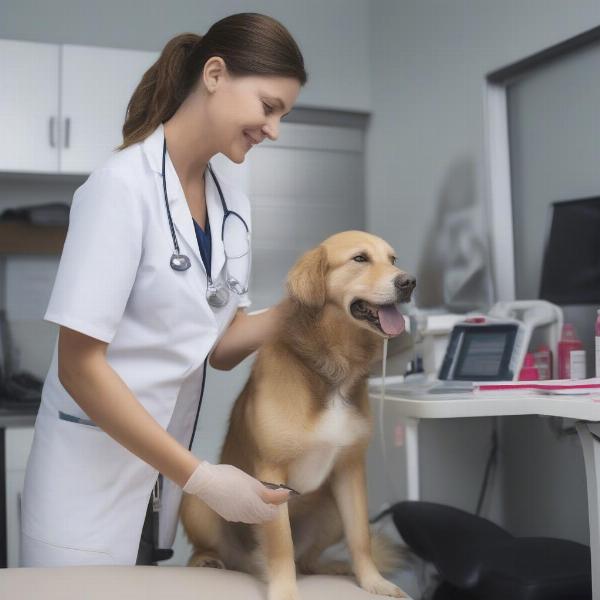Knowing if a dog has had puppies can be important for a variety of reasons, from assessing her health needs to understanding her behavior. While some signs are obvious, others are more subtle. This article will guide you through the key indicators that can help you determine if a dog has given birth, covering both physical and behavioral changes.
Physical Signs a Dog Has Had Puppies
Several physical changes can indicate a dog has recently whelped. The most obvious is the presence of milk, especially if you gently press on her nipples. Even if the puppies are no longer with her, milk production will continue for a while. Her mammary glands will also be enlarged and may appear slightly pinker than usual.
Another tell-tale sign is a distended abdomen. While this will gradually reduce after birth, it won’t return to its pre-pregnancy size immediately. You may also notice some loose skin around her belly area. Furthermore, there might be some vaginal discharge, which can vary in color and consistency but should not have a foul odor. A strong, unpleasant smell could indicate an infection.
Behavioral Changes in a Dog After Giving Birth
A mother dog’s behavior will noticeably shift after having puppies. She’ll be highly protective of her litter, often exhibiting nesting behavior and becoming more territorial. She might be reluctant to leave her puppies, even for short periods. You may also observe her licking and cleaning her pups constantly, a crucial part of their early development.
If the puppies are still with her, you’ll witness her nursing them regularly. Even if they are separated, she might exhibit anxiety or restlessness, pacing and whining as she searches for them. Her appetite might increase as she requires more energy to produce milk.
Can You Tell if a Dog Has Had Puppies a Long Time Ago?
Determining if a dog has had puppies a long time ago is more challenging. Some physical signs, like slightly stretched nipples or a bit of loose skin around the abdomen, might remain. However, these can be subtle and easily overlooked, especially in certain breeds. There are no reliable behavioral indicators for past pregnancies. Unless you have her breeding history, it’s difficult to know for certain.
When to Consult a Veterinarian
If you suspect a dog has recently given birth and she’s exhibiting signs of illness, such as lethargy, loss of appetite, or excessive discharge with a foul odor, consult a veterinarian immediately. These could be symptoms of postpartum complications.
 Veterinarian Examining a Dog
Veterinarian Examining a Dog
Conclusion: Identifying if a Dog Has Had Puppies
Identifying whether a dog has had puppies relies on observing physical changes like enlarged mammary glands, loose abdominal skin, and milk production, alongside behavioral changes like increased protectiveness and nesting instincts. While recent births are easier to identify, determining past pregnancies can be difficult. If you’re unsure or notice any signs of illness, consult a veterinarian for professional advice.
FAQ:
- How long does a dog produce milk after giving birth? Milk production typically continues for several weeks after weaning, which usually occurs around 6-8 weeks after birth.
- Is vaginal discharge normal after a dog gives birth? Yes, some discharge is normal, but it should not have a foul odor.
- How long does it take for a dog’s abdomen to return to normal after giving birth? It can take several weeks or even months for the abdomen to fully shrink back.
- Will a dog’s behavior always change after giving birth? While most dogs exhibit noticeable changes in behavior, the intensity can vary.
- Can a vet confirm if a dog has had puppies in the past? A vet may be able to identify some subtle physical indicators, but it’s not always possible to definitively confirm past pregnancies.
- What are the signs of postpartum complications in dogs? Lethargy, loss of appetite, fever, foul-smelling discharge, and lack of interest in puppies are potential signs of complications.
- Should I separate a mother dog from her puppies? No, unless absolutely necessary (e.g., for medical reasons). The mother dog needs to be with her puppies, especially in the first few weeks.
Related Articles:
dog parks bakersfield ca
belgian malinois dogs for sale in texas
sole survivor in reservoir dogs crossword clue
bernese mountain dog south africa
ILM Dog is your go-to resource for expert advice on dog breeds, health, training, nutrition, grooming, and much more. Whether you’re a seasoned dog owner or just starting your journey, we offer valuable insights and practical tips to help you provide the best possible care for your canine companion. We specialize in breed selection guidance, health and wellness advice, and training techniques to nurture a strong bond between you and your furry friend. For personalized advice or inquiries, contact us at [email protected] or +44 20-3965-8624. Visit ILM Dog today!